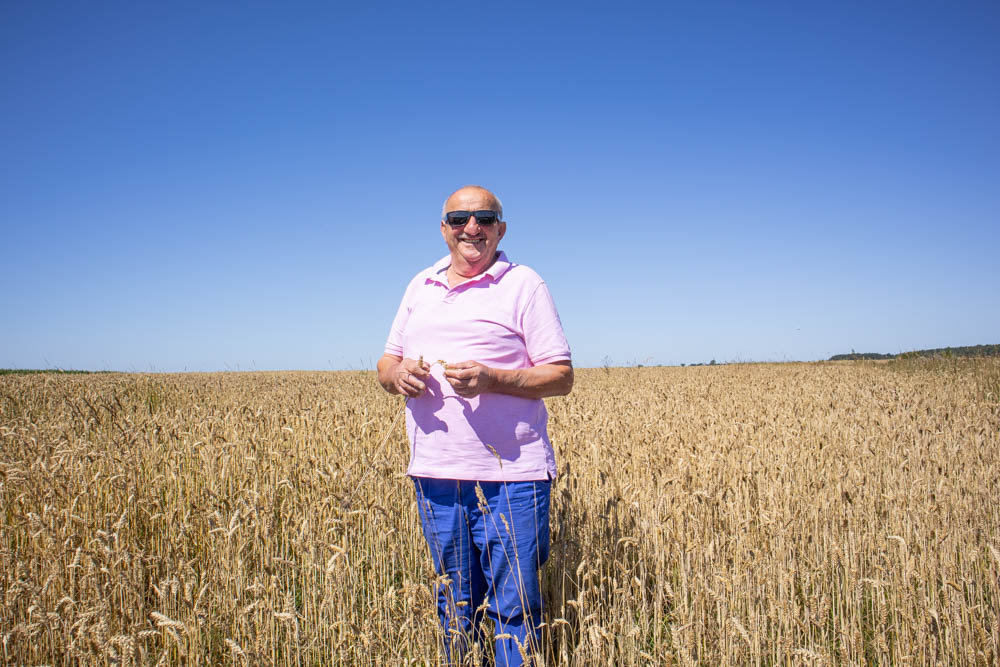
HOPE’s Response in Ukraine – July 2022
Six months after Russia invaded Ukraine, fighting continues in the south and east of the country, with little territory being gained or lost on either side. Recently, the Ukrainian military said that they have successfully repelled Russian attacks and made several successful counterattacks. While the war rages on, some ships filled with grain have been able to leave Odesa port as part of a U.N.-Turkey-brokered deal that also lifted sanctions on Russian wheat and fertilizer. Though some Ukrainian farmers, including many HOPE clients, continued to plant and harvest amid upheaval, the conditions caused by war prevented most crops from being transported, exported, or used for months. The International Monetary Fund expects Ukraine’s economy to shrink by 35% this year due to the damage and fall out of the war, leaving already vulnerable groups in sometimes dire positions.

Since the war began, HOPE has provided funding to a network of local churches and organizations in Ukraine, Moldova, Romania, and Poland through connections that have been built over the course of 25 years of ministry in Ukraine. During this Resourcing Relief stage, the focus has been on helping with immediate and time-bound relief (food, medical supplies, shelter) for displaced people. HOPE’s partners have helped over 200,000 people–a majority of whom received one-time assistance. Note: HOPE is not the only organization providing assistance funds to these partners.
Wanting to ensure that we are not creating dependency or committing to initiatives that cannot be supported long-term, leadership will be revising HOPE’s grant-making guidelines for supporting the work of partners as we move forward.
For entrepreneurs in western Ukraine, farther from the war, HOPE Ukraine extended grace periods on loan repayments and interest accrual through June. For those living in southern and eastern Ukraine in occupied territory, their grace period has been extended to 12 months. This will be re-evaluated on an ongoing basis.
In June, HOPE’s response to the war in Ukraine started to transition from the Resourcing Relief stage to the Resilience stage. The HOPE Ukraine team is working with several loan officers who are in a stable enough position to restart lending operations for entrepreneurs who can leverage loans right now. So far, HOPE Ukraine has disbursed 9 loans—in farming, housing, and business—since the war began. (See Igor’s story below!)
A story from Ukraine: “Hope dies last.”
Igor* has farmed for more than 40 years. In 2015, he retired from his long-time job as the director of a large private farm in western Ukraine. But his pension wasn’t enough to live off of, nor did he want to be idle. “I just can’t sit at home. I must do something!”
Combining rented fields with the land he owns, Igor invested in growing soy and corn. Farming is a challenging job, as you deal with uncontrollable forces like the weather and fluctuating market prices for fuel and crops. Despite these challenges, he says resolutely, “Hope dies last.”
“This year we’ll have problems, too,” he says. “The prices are low or are not set, and if earlier the crops were taken to the seaports and exported, this year [because of war] we don’t know how that will be. Now I harvest the rapeseed, and I just store it, since I don’t know the price yet.”
It’s been a challenging season for Igor. One bank refused his loan application, and increased fuel prices meant his operational costs were up. But he appreciates HOPE Ukraine’s investment in his farm—“Your terms are good!”
Standing in a field of golden wheat ready for harvest, Igor reflects on the future. “There is a threat of hunger throughout the world this year with this war going on.”
He shares about his son, who is a police officer: “My son was summoned and paid his duty in the frontline. … My son will go there again sometime soon. The policemen are asked to help the soldiers when needed.”
Even here, hundreds of miles from the frontlines of the war, there is a sense of uneasiness about what is next. As a distant combine harvests fields of rapeseed, Igor shares, “Hard to say now, in such uncertainty, if or when I will take another loan.”
Still, hope dies last. And his commitment to farming is unshaken. He says, “If the war is over, I won’t need help. I will be helping others myself.”
*Name withheld for security